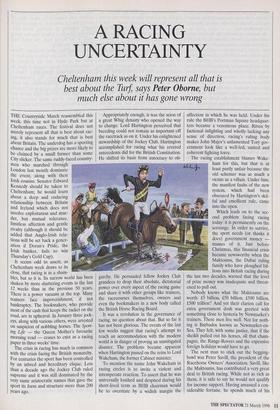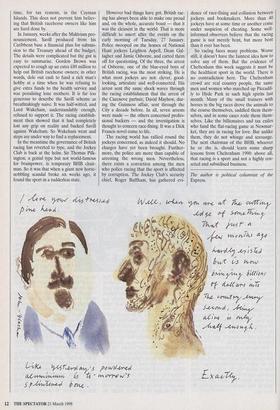A RACING UNCERTAINTY
Cheltenham this week will represent all that is
best about the Turf; says Peter Oborne, but
much else about it has gone wrong
THE Countryside March reassembled this week, this time not in Hyde Park but at Cheltenham races. The festival does not merely represent all that is best about rac- ing, it also stands for much that is best about Britain. The underdog has a sporting chance and the big prizes are more likely to be claimed by a small farmer than some City slicker. The same ruddy-faced country- men who marched through London last month dominate the event, along with their Irish cousins. Senator Edward Kennedy should be taken to Cheltenham; he would learn about a deep and enduring relationship between Britain and Ireland which does not involve exploitation and mur- der, but mutual tolerance, limitless affection and gentle rivalry (although it should be added that Anglo-Irish rela- tions will be set back a gener- ation if Doran's Pride, the Irish banker, fails to win Thursday's Gold Cup).
It seems odd to assert, as Cheltenham week draws to its close, that racing is in a sham- bles, but so it is. Its narrow world has been shaken by more shattering events in the last 12 weeks than in the previous 50 years. There is a power vacuum at the top. Many trainers face impoverishment, if not bankruptcy. The bookmakers, who provide most of the cash that keeps the racket on the road, are in upheaval. In January three jock- eys, along with various others, were arrested on suspicion of nobbling horses. The Sport- ing Life — the Queen Mother's favourite morning read — ceases to exist as a racing paper in three weeks' time. The crisis in racing has much in common with the crisis facing the British monarchy. For centuries the sport has been controlled by an inbred and hereditary clique. Less than a decade ago the Jockey Club ruled supreme and it was still dominated by the very same aristocratic names that gave the sport its form and structure more than 200 years ago. Appropriately enough, it was the scion of a great Whig dynasty who opened the way to change. Lord Harlington perceived that breeding could not remain as important off the racetrack as on it. Under his enlightened stewardship of the Jockey Club, Hartington accomplished for racing what his revered antecedents did for the British Constitution. He shifted its basis from autocracy to oli- garchy. He persuaded fellow Jockey Club grandees to drop their absolute, dictatorial power over every aspect of the racing game and share it with other groups like trainers, the racecourses themselves, owners and even the bookmakers in a new body called the British Horse Racing Board.
It was a revolution in the governance of racing, no question about that. But so far it has not been glorious. The events of the last few weeks suggest that racing's attempt to reach an accommodation with the modern world is in danger of proving an unmitigated disaster. The problems became apparent when Hartington passed on the reins to Lord Wakeham, the former Cabinet minister.
To mention the name John Wakeham in racing circles is to invite a violent and intemperate reaction. To assert that he was universally loathed and despised during his short-lived term as BHB chairman would be to overstate by a widish margin the affection in which he was held. Under his rule the BHB's Portman Square headquar- ters became a venomous place. Riven by factional infighting and wholly lacking any sense of direction, racing's ruling body makes John Major's unlamented Tory gov- ernment look like a well-led, united and coherent fighting force.
The racing establishment blames Wake- ham for this, but that is at least partly unfair because the old schemer was as much a victim as a villain. Under him, the manifest faults of the new system, which had been obscured by Hartington's skil- ful and emollient rule, came into the open.
Which leads on to the sec- ond problem facing racing today: it is permanently on the scrounge. In order to survive, the sport needs (or thinks it does) government money masses of it. Just before Christmas, this financial crisis became newsworthy when the Maktoums, the Dubai ruling family who have ploughed bil- lions into British racing during the last two decades, warned that the level of prize money was inadequate and threat- ened to pull out.
Nobody knows what the Maktoums are worth: £5 billion, £50 billion, £500 billion, £500 trillion? And yet their clarion call for extra government dosh was greeted with something close to hysteria by Newmarket's trainers. These men live well. Not for noth- ing is Barbados known as Newmarket-on- Sea. They felt, with some justice, that if the sheikh pulled out his horses, all that cham- pagne, the Range-Rovers and the expensive foreign holidays would have to go.
The next man to stick out the begging- bowl was Peter Savill, the president of the Racehorse Owners' Association. Savill, like the Maktoums, has contributed a very great deal to British racing. While not as rich as them, it is safe to say he would not qualify for income support. Having amassed a con- siderable fortune, he spends much of his time, for tax reasons, in the Cayman Islands. This does not prevent him believ- ing that British racehorse owners like him are hard done by. In January, weeks after the Maktoum pro- nouncement, Savill produced from his Caribbean base a financial plan for submis- sion to the Treasury ahead of the budget. The details were complicated but the gist is easy to summarise. Gordon Brown was expected to cough up an extra £80 million to help out British racehorse owners; in other words, dole out cash to fund a rich man's hobby at a time when he was refusing to give extra funds to the health service and was penalising lone mothers. It is far too generous to describe the Savill scheme as breathtakingly naive. It was half-witted, and Lord Wakeham, understandably enough, refused to support it. The racing establish- ment then showed that it had completely lost any grip on reality and backed Savill against Wakeham. So Wakeham went and steps are under way to find a replacement. In the meantime the governance of British racing has reverted to type, and the Jockey Club is back at the helm. Sir Thomas Pilk- ington, a genial type but not world-famous for brainpower, is temporary BHB chair- man. So it was that when a giant new horse- nobbling scandal broke six weeks ago, it found the sport in a rudderless state. However bad things have got, British rac- ing has always been able to make one proud and, on the whole, accurate boast — that it was the cleanest in the world. That is more difficult to assert after the events on the early morning of Tuesday, 27 January. Police swooped on the homes of National Hunt jockeys Leighton Aspell, Dean Gal- lagher and Jamie Osborne, and carted them off for questioning. Of the three, the arrest of Osborne, one of the blue-eyed boys of British racing, was the most striking. He is what most jockeys are not: clever, good- looking, articulate and well-connected. His arrest sent the same shock waves through the racing establishment that the arrest of the Cazenove partner, David Mayhew, dur- ing the Guinness affair, sent through the City a decade before. In all, seven arrests were made — the others concerned profes- sional backers — and the investigation is thought to concern race-fixing. It was a Dick Francis novel come to life. The racing world has rallied round the jockeys concerned, as indeed it should. No charges have yet been brought. Further- more, the police are more than capable of arresting the wrong men. Nevertheless, there exists a conviction among the men who police racing that the sport is affected by corruption. The Jockey Club's security chief, Roger Buffham, has gathered evi- dente of race-fixing and collusion between jockeys and bookmakers. More than 40 jockeys have at some time or another come under suspicion of cheating. Some well- informed observers believe that the racing game is not merely bent, but more bent than it ever has been. So racing faces many problems. Worse still, it doesn't have the faintest idea how to solve any of them. But the evidence of Cheltenham this week suggests it must be the healthiest sport in the world. There is no contradiction here. The Cheltenham crowd are real country people, the same men and women who marched up Piccadil- ly to Hyde Park in such high spirits last month. Many of the small trainers with horses in the big races drove the animals to the course themselves, saddled them them- selves, and in some cases rode them them- selves. Like the billionaires and tax exiles who fund the flat-racing game at Newmar- ket, they are in racing for love. But unlike them, they do not whinge and scrounge. The next chairman of the BHB, whoever he or she is, should learn some sharp lessons from Cheltenham 1998: above all, that racing is a sport and not a highly cos- seted and subsidised business.
The author is political columnist of the Express.





































































 Previous page
Previous page